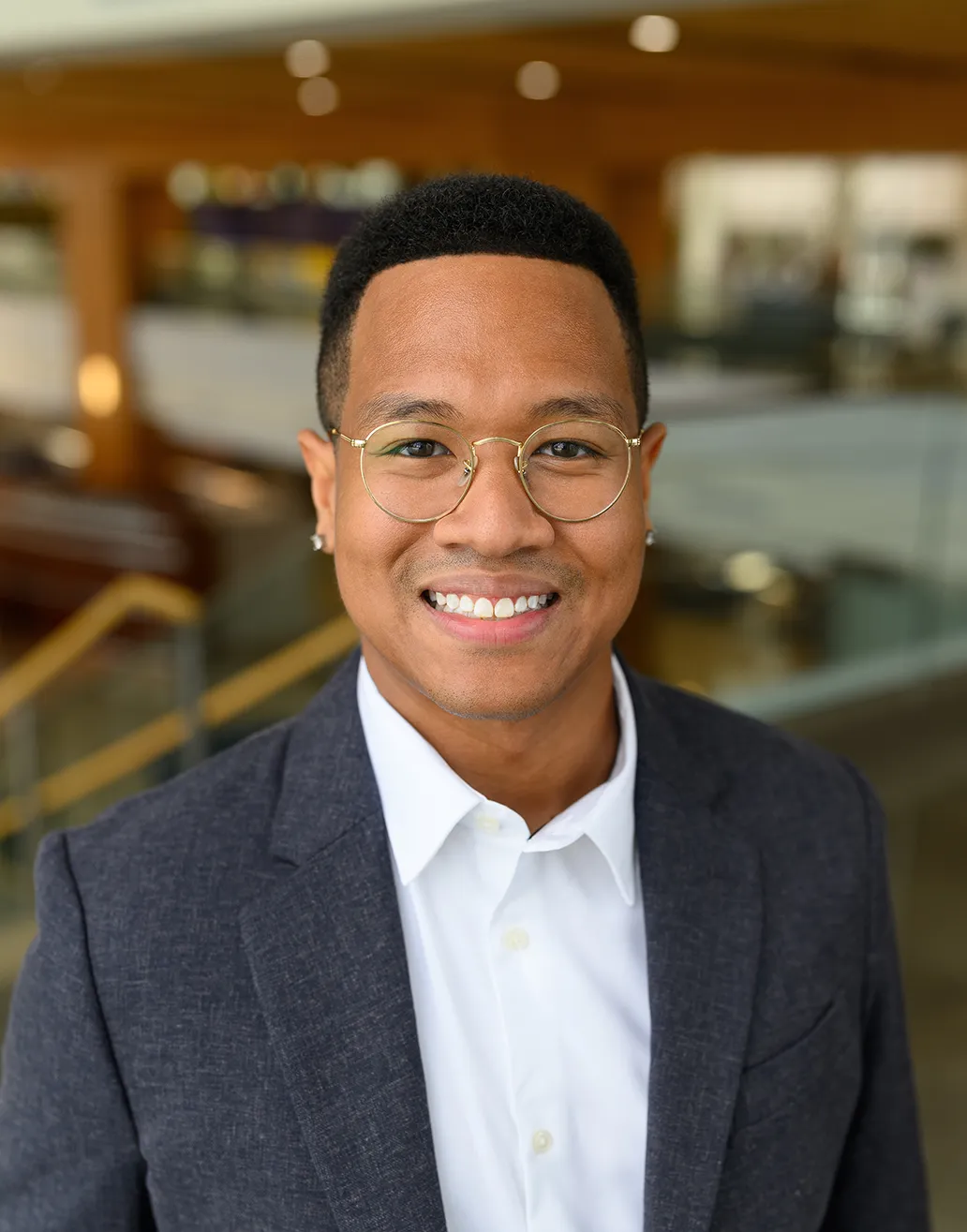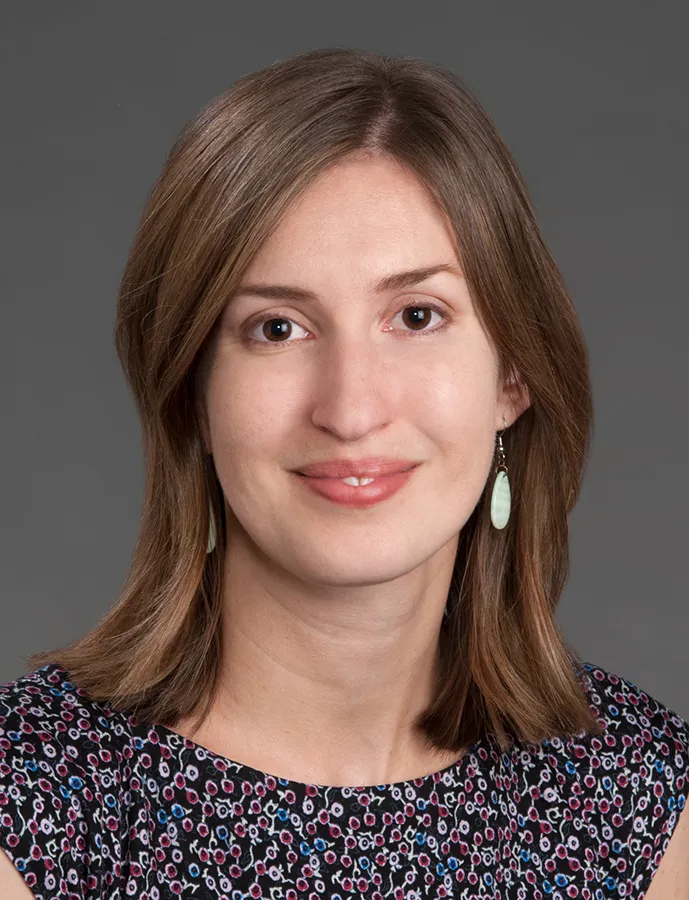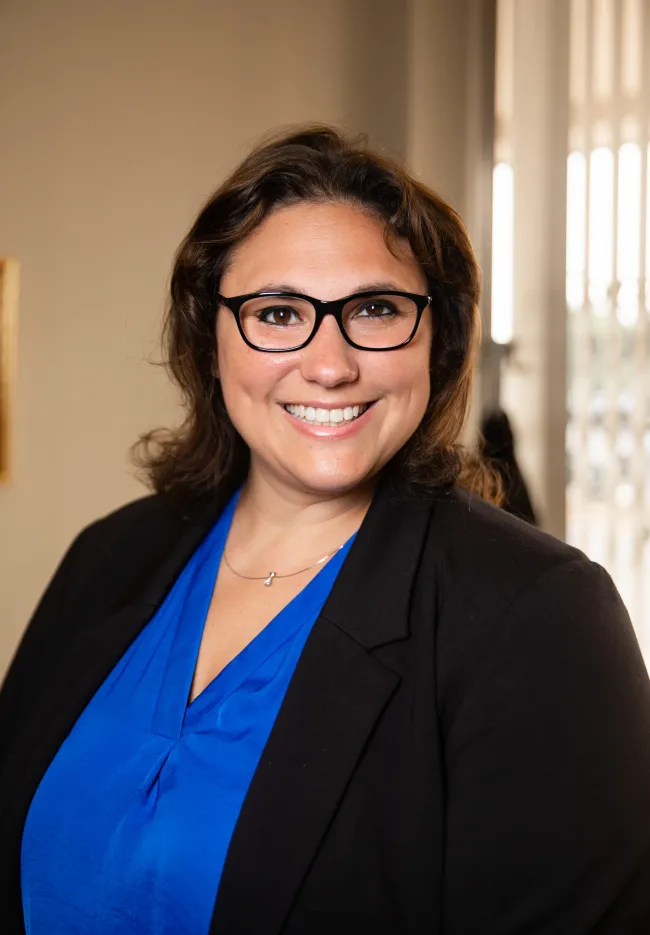
CHET Primary Faculty

Darlingtina K. Esiaka, PhD, CPG, CPH
Dr. Darlingtina Esiaka is an assistant professor in the department of behavioral science, the Center for Health, Engagement, and Transformation (CHET), and the Sanders-Brown Center on Aging. Her research interests revolve around two major themes. One focuses on the early detection of Alzheimer's disease and related dementias (ADRD) in high-risk populations. She examines how to detect progression and conversion to ADRD, long before the presentation of behavioral symptoms. The second focuses on the early detection of cancer in older men. She investigates psychosocial factors that predict fatal-stage cancer diagnosis and survivorship in older men. Her work has received support from federal and private funders such as NIA, the New Jersey Health Foundation, the Michigan Center for Contextual Factors in Alzheimer’s Disease, and the Alzheimer’s Association. Dr. Esiaka is a certified Public Health professional and is credentialed by the National Association of Professional Gerontologists. She has published several journal articles, book chapters, and an edited book. She has received over 20 awards and recognitions, including the Emily Taylor Center for Women & Gender Equity – Kathleen McCluskey-Fawcett Woman Mentoring Women award and the Gerontological Society of America (GSA)'s Career Development and Junior Investigator Diversity Fellow Award. Dr. Esiaka is affiliated with several professional organizations, including the International Society to Advance Alzheimer's Research and Treatment (ISTAART, the Society for the Study of Human Development (SSHD), and the Society for Psychological Study of Social Issues, where she serves as a council member and chairs the internationalization committee.

Erica Littlejohn, PhD
Dr. Erica Littlejohn is an assistant professor in the department of behavioral science, the Center for Health, Engagement and Transformation, and has affiliations in the Sanders-Brown Center on Aging and Spinal Cord and Brain Injury Research Center. Her overarching goal is to reduce the burden of neurological disease experienced by disproportionately impacted populations by elucidating the pathways and neurobiological mechanisms that drive neuropathology. Through her experience as a basic science researcher and expertise in neurological disease health inequities, she aims to develop a translational research program to advance research and undergird future health disparities interventions. Her current research specifically centers on investigating the role of social determinants of health (SDOH) and adverse childhood experience (ACE) exposure in mediating the risk and progression of cognitive impairment and decline in older adults. As part of her pre-clinical neuro-equity research foci, she examines the impact of ACE exposure and SDOH in multiple models of cognitive impairment, including traumatic brain injury (TBI), vascular cognitive impairment, and Alzheimer’s disease and related dementias (ADRD). Erica was previously an AAAS Fellow within the NIH National Institute of Neurological Disorders and Stroke (NINDS) Office of Global Health and Health Disparities (OGHHD) in the Division of Clinical Research. Along with renowned experts, Dr. Littlejohn was a part of the team that developed the NINDS Social Determinants of Health Framework as a part of the NINDS health equity strategic planning. She also completed a postdoctoral fellowship at the University of Texas, Health Science Center at San Antonio, as an NIH T32 training grant fellow in Pathobiology of Occlusive Vascular Disease. She investigated the electrophysiological function of GABAergic vagal neurons in the brainstem and its central regulation of peripheral metabolism and cardiovascular health. Prior to her fellowship and postdoc positions, Dr. Littlejohn completed her PhD at the University of Kentucky (UK) where she investigated cellular and molecular mechanisms underlying post-traumatic neural plasticity. During her predoctoral training she served as the President of the UK Black Graduate and Professional Student Association (UKBGPSA) and led the organization of the 2016 UKBGPSA: Call to Action Town Hall event. She was the recipient of the University of Kentucky Shane Carlin & Annie Sit Inclusion Award (2016) and the Kentucky Multicultural Opportunities, Strategies, and Institutional Inclusiveness Consortium (MOSAIIC) Award (2016).

Delvon Mattingly, PhD
Dr. Mattingly is a Research assistant professor in the department of behavioral science and a primary faculty member of the Center for Health, Engagement, and Transformation. He is also a member of the Markey Cancer Center’s Cancer Prevention and Control Program and Co-Lead of the Career Enhancement Core for the Appalachian Tobacco Regulatory Science Team, a Tobacco Center of Regulatory Science (AppalTRUST, TCORS 3.0).
A social epidemiologist, Dr. Mattingly investigates how psychosocial, policy, and structural determinants of health influence substance use and addiction, cancer prevention and control, and related health disparities. He completed the majority of his research training through two NIH/FDA-funded Tobacco Centers of Regulatory Science: the American Heart Association Tobacco Regulation and Addiction Center (A-TRAC, TCORS 1.0) and the University of Michigan/Georgetown University Center for the Assessment of Tobacco Regulations (CAsToR, TCORS 2.0).
Dr. Mattingly serves on the editorial boards of Scientific Reports and the American Journal of Drug and Alcohol Abuse. He is a Helping Everyone Achieve a Lifetime of Health-Future Addiction Scientist Training (HEALTH-FAST) Scholar and a recent recipient of the American Public Health Association’s National Violent Death Reporting System (NVDRS) New Investigator Award. He has published more than 60 peer-reviewed articles and currently leads multiple funded research studies, including a National Cancer Institute Supplement examining how local flavored tobacco control policies shape disparities in flavored e-cigarette use among young adults.

Laurie McLouth, PhD
Dr. McLouth joined the department of behavioral science and the Center for Health, Engagement and Transformation in 2019. She is an associate professor of behavioral science and a clinical psychologist with expertise in cancer survivorship, multilevel interventions, palliative care, and implementation science. Dr. McLouth has received numerous national awards, including being named an NCI Cancer Moonshot Scholar. Dr. McLouth directs Markey Cancer Center’s Patient-Oriented and Population Sciences Shared Resource and Markey’s Cancer Survivorship Research Initiative.
Dr. McLouth’s program of research focuses on developing and testing interventions to improve quality of life and quality of cancer care for patients and their caregivers facing advanced cancer, particularly in rural and socioeconomically strained areas. She is a behavioral researcher with expertise and research interests that include: (1) conducting quantitative and qualitative research to understand the impact of new cancer treatments on patients and their families; (2) developing and evaluating supportive care and survivorship care interventions that leverage positive psychology; and (3) identifying multi-level intervention targets to improve cancer care delivery and increase access to guideline-concordant cancer care. She is currently PI of an NCI-funded R01 to test the efficacy of a brief, hope-enhancing intervention delivered at the point of care for patients with advanced lung cancer.

Justin Moore, PhD, MPH
Dr. Justin X. Moore serves as an associate professor within the Center for Health, Engagement, and Transformation (CHET) at the University of Kentucky College of Medicine, with additional roles as assistant director of population science in the department of internal medicine and assistant director of community impact at the Markey Cancer Center. Trained as an epidemiologist, Dr. Moore has extensive expertise in epidemiologic methodology, biostatistics, database design, geographic information systems (GIS), mediation analysis, Bayesian methods, and cancer prevention and control.
His research focuses on how social and environmental factors, cumulative stress, and biological mechanisms interact to influence cancer outcomes, particularly among medically and socially underserved populations. Dr. Moore’s work has identified geographic “hot spots” of excess mortality from breast cancer, lung cancer, early-onset colorectal cancer, sepsis, and COVID-19, underscoring the importance of context in understanding disparities in health outcomes. Current projects extend this line of inquiry to examine how barriers to screening, life-course stressors, mammographic density, and epigenetic markers shape cancer risk and survivorship.
Dr. Moore has published more than 100 peer-reviewed scientific articles, with over 50 as lead or senior author, in top journals including JAMA, Cancer Epidemiology, Critical Care, and The Journal of Clinical and Translational Science. His research portfolio has been supported by multiple NIH-funded projects, including the recently completed K01 Career Development Award from the National Institute on Minority Health and Health Disparities and an ongoing R21 from the National Cancer Institute on social determinants of early-onset colorectal cancer.
Nationally recognized for his contributions, Dr. Moore received the 2022 American Association for Cancer Research Faculty Award for his work on advancing understanding of differences in cancer outcomes. His long-term goal is to reduce the burden of preventable disease by generating evidence that informs interventions and partnerships designed to improve cancer prevention, screening, and care delivery for underserved communities.

Elizabeth Rhodus, PhD, MS, OTR/L
Dr. Elizabeth Rhodus, an assistant professor in the department of behavioral science and Sanders-Brown Center on Aging, and primary faculty of the Center for Health, Engagement, and Transformation in the College of Medicine at the University of Kentucky, has developed a research program based on clinical experiences as an occupational therapist with patients across the lifespan, during which she recognized the influence of the environmental supports on behaviors of those with cognitive impairment. However, a lack of robust assessment and evidence-based interventions focused on the relationship between person and environment undermines rigorous and effective clinical decision making. This gap and the substantial need in clinical care fueled her career shift to scholarship. Her research training has been framed with a strong theoretical understanding of aging with a PhD in gerontology and training in clinical trial design as a post-doctoral scholar at the University of Kentucky’s Alzheimer’s Disease Research Center funded by the NIH/NIA T32. Her career has additionally focused on clinical, service-oriented support, and research in areas throughout rural Appalachia including hospital-based care, home health, and skilled nursing facilities. These experiences exemplified health challenges which plague rural residents. Dr. Rhodus’ long-term career goal is to develop patient-oriented behavioral interventions which will promote healthy aging and quality of life for older adults.

Founding Director: Nancy Schoenberg, PhD
Dr. Schoenberg is the Marion Pearsall Professor of Behavioral Science (College of Medicine) and associate vice president for research, with a focus on research professional development. Dr. Schoenberg also serves as associate director of UK’s Center for Clinical and Translational Science. A medical anthropologist and gerontologist, her expertise as a health disparities researcher converges in two areas, community-engaged randomized behavioral trials and research training. Her community-engaged research addresses the prevention and control of chronic conditions among rural residents and other populations. She focuses on the contextual underpinnings and lifestyle factors that elevate the risk of diabetes, cardiovascular disease, and cancer. In collaboration with communities, she and her team design, implement, and disseminate interventions. With continuous NIH support since 2000, Dr. Schoenberg has served as a PI or MPI on the following projects: “Patient Navigation for Cervical Cancer in Appalachia” (R01 CA120606); ”Faith Moves Mountains: A CBPR Appalachian Wellness & Cancer Prevention Program” (R24 MD002757); the first known Appalachian faith-based RCT for cancer screening (“An Appalachian Cervical Cancer Prevention Project”, R01 CA108696); “An Intergenerational CBPR Intervention to Reduce Appalachian Health Disparities” (R01 DK081324); ”Appalachians Together Restoring the Eating Environment (Appal-TREE)” (R24 MD008018); “Community-engaged Research & Action to Reduce Respiratory Disease in Appalachia” (R01 ES024771); “Appalachians Together Restoring the Eating Environment (Appal-TREE): Advancing Sustainable CBPR Interventions to Improve Healthy Diet in Rural Appalachian Children” (U01 MD010556). She currently leads an R01 community-engaged randomized behavioral trial (R01 HL152714) that deploy implementation science approaches, Community Health Worker protocols, and technology. She regularly provides peer review for the NIH, consults on behavioral research initiatives across the nation, and oversees, and serves on three editorial boards.
Developing the evidence base for effective research training constitutes a second component of Dr. Schoenberg’s career. Having served as a PI, MPI, or co-investigator on eight training grants, as a mentor to numerous NRSA and K awardees, and as a faculty mentor to over 70 pre and postdoctoral trainees or junior faculty members, she aims to nurture and enhance research development. Professional publications and presentations provide evidence of her commitment to mentees; over the past 25 years, Dr. Schoenberg’s mentees have co-published over 200 presentation abstracts and peer reviewed articles and chapters, often times taking first authorship. She has served as a PI, faculty member or lead mentor for T32 programs, NSF career development awards, K awards, F awards, and others, including “Addressing Rural Cancer Inequities through Scientific Excellence”(ARISE, T32 CA261786). She is the contact PI on a P50 (P50MD019476) grant entitled “Achieving Success in Community-Engaged research to elimiNate Disparities).